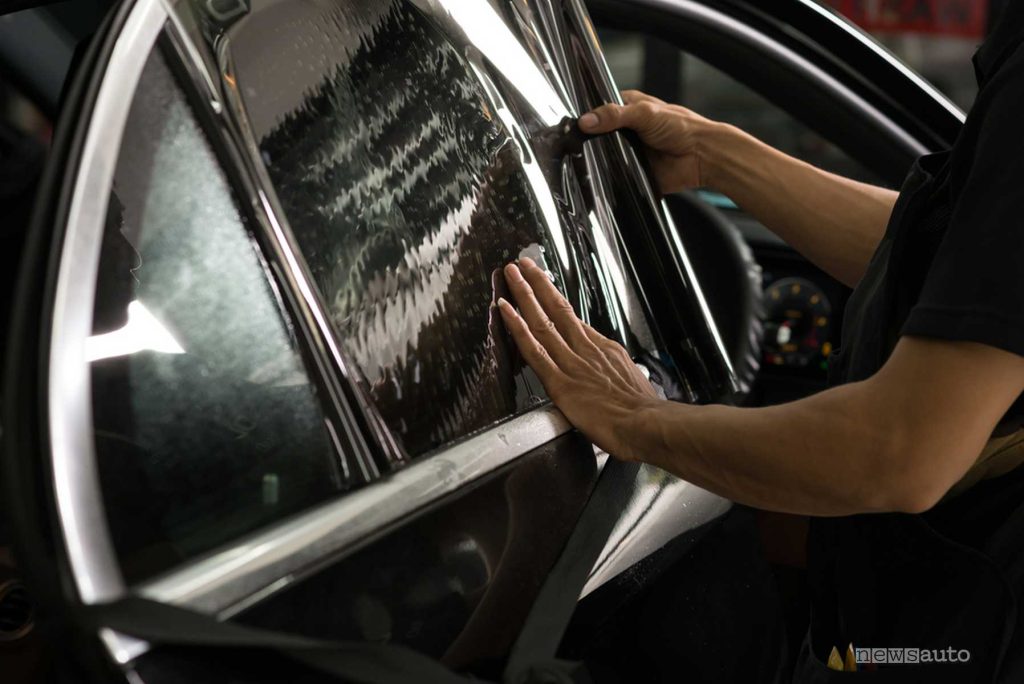Using film to darken car windows is a common practice that offers many benefits advantages. The main reasons why people choose to tint their vehicle windows is that block UV rays and heat, while offering many other benefits. But let’s examine in detail the reasons why it is advisable to darken the windows of your car.
Tinted car windows, benefits
So here are the advantages of having tinted windows:
- Affordability: at a time when petrol prices are rising, saving is important. In this sense, tinted films reduce up to 99% of UV rays, limiting the internal heat of the vehicle. In summer, therefore, fuel or electricity consumption is significantly reduced. Secondly, it pollutes less, because by keeping the car cooler, tinted windows reduce the need to use theair conditioningresulting in fuel savings. All this translates into a reduction in CO2 emissions, contributing to a lower environmental impact.
- Privacy: In most cases, tinted windows reduce visibility inside the car, protecting passengers and the contents of the car from prying eyes.
- Safety: the difficulty of seeing inside discourages thieves, reducing the risk of theft. In addition, if damaged, the rear windows break. The darkening film, which is attached to the glass thanks to an adhesive film, in the event of a crash, is a very useful brake on the dispersion of pieces and fragments of glass.
- Comfort: tinting films reduce by 50% the light and reflections that enter the vehicle and disturb the driver when looking in the rearview mirror. In addition, low temperatures inside the car improve the comfort of passengers, especially during the summer months.
- Duration: tinted glass filters UV rays, protecting the skin of passengers from sun damage. They also preserve the interior of the passenger compartment by reducing exposure to UV rayswindow tint helps prevent fading and deterioration of your car’s interior materials, such as the seats and dashboard.
- Aesthetics: Tinted windows can enhance the appearance of your car, making it appear more modern and sophisticated. A car with tinted windows may have a higher perceived value in the used market, potentially increasing its resale value.
Car window tinting films
Car window tinting is an intervention that consists of the application of a special film on the vehicle windowsThere are mainly two methods for darkening car windows, by applying films or using already treated glass:
- Application of films:
- Pre-cut films: They are the most common and are made to measure for each car model. The application is faster and more precise.
- Hand cut films: offer greater customization, but require more complex and accurate installation.
- Colored films: They vary in shade and allow you to choose the desired degree of darkening.
- Infrared films: In addition to darkening, they block a significant portion of infrared rays, reducing the heat inside the passenger compartment.
- Tinted windows:
- Already tinted windows: in this case, the original windows are replaced with others already tinted in the factory. It is a more expensive and invasive method. When ordering a new car, it is advisable to order it with tinted windows already!

Procedure for applying window films:
- Cleaning the windows: the windows are carefully cleaned and degreased to ensure perfect adhesion of the film.
- Film cutting: The film is cut to size for each glass, following the shapes and curves.
- Application: the film is moistened with a specific solution and applied to the glass, eliminating any air bubbles with the help of a spatula.
- Drying: the film is left to dry for a few hours.
Tinted car windows, regulations
There is a very specific regulation on the darkening of car windows: it is the Italian and European regulation, art. 71 CdS, 92/22/CEE, 71/127/CEE and 77/649/CEE which provides that the windows and rear windows can be darkened, provided that the car is equipped with mirrors on the two front sides.
The films used must be approved and ensure adequate visibility while driving.
Practical and legal considerations
It is important to note that regulations regarding window tinting may vary from country to country and, in some cases, from region to region. In Italy, for example, it is only permitted to tint the rear windows (rear window) and rear side windows, while the front windows (windscreens) must maintain a certain transparency to ensure visibility and road safety.
In conclusion, tinting your car windows offers numerous benefits, from privacy to sun protection, energy efficiency to aesthetics. However, it is essential to know the local laws and make sure that the installation is done correctly to avoid legal and safety issues. To tint your vehicle windows, it is obviously advisable to contact a professional and avoid doing it yourself.
#Car #Window #Tinting #Films #Benefits
